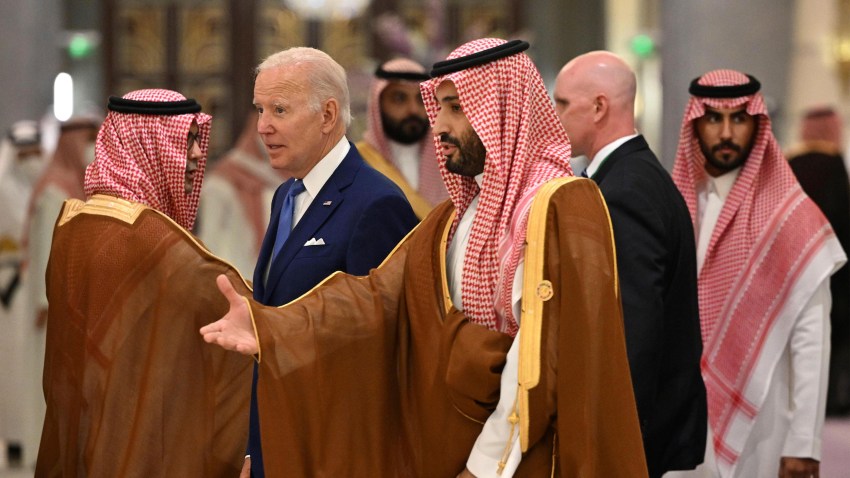Hello everyone. Today at WPR, we’ve got stories on why a nuclear-armed Saudi Arabia shouldn’t be too concerning for the U.S. and the challenges posed by private military companies for humanitarian aid delivery.
Now, here’s our take on today’s top story:
Russia-Africa: On the second day of a summit in St. Petersburg, leaders from several African countries pressed Russian President Vladimir Putin to move ahead with their proposed peace plan to end the war in Ukraine and renew a deal allowing safe passage for Ukrainian grain ships on the Black Sea. (Reuters)
Our Take: The forcefulness with which African leaders have pressured Putin over the war’s impact on their countries demonstrates their agency and savviness in pursuing their national interests. That’s something for which their critics in the West—frustrated by many African governments’ refusal to more vocally criticize Moscow over the war—have not given them enough credit.
However, the fact that African leaders are in a position to put pressure on Putin at this summit is in many ways a direct result of how they have so far navigated their position on the war in Ukraine. That has not only allowed them to maintain open communication channels with Moscow, but also created incentives for Putin to take their concerns seriously.
More broadly, this summit highlights the ways in which Global South leaders are becoming more proactive in terms of using their leverage in negotiations with leaders from the Global North. In this case, those negotiations are about the war in Ukraine, but we’ve seen a similar dynamic on display regarding other issues, like the effects of climate change and EU-Latin America relations.
*****
You can read the rest of today’s News Wire, a curated selection of one must-read article from every region, here.

U.S. Fears of a Nuclear-Armed Saudi Arabia Are Overblown
Back in March, Saudi Arabia reportedly offered to join the Abraham Accords, which normalized relations between Israel and several Middle Eastern countries. In return, the kingdom is asking the U.S. for promises of long-term arms contracts and, most notably, the transfer of civil nuclear technology.
That’s a tradeoff Washington is reluctant to make, as civil nuclear technology could be used to develop nuclear weapons. As columnist Paul Poast writes, though, Saudi Arabia acquiring a nuclear weapon should not be particularly concerning for Washington. Read more.
Private Military Companies Have Also Complicated Humanitarian Aid
Negotiations with armed groups are often a critical part of providing humanitarian aid in conflict-affected contexts, and engagement with nonstate actors has become standard practice.
However, engaging with private military companies—like the now infamous Wagner Group—is relatively new territory. As Anne Lauder and Hilary Matfess write, aid organizations should acknowledge the challenge posed by the rise of private military companies and the new issues that need to be addressed as a result. Read more.

Bolivia has begun to use the yuan to pay for trade transactions with China, joining Brazil and Argentina on the list of South American countries that already use the Chinese currency to do so.
Over the past decade, the global appeal—and use—of the yuan has improved due to financial reforms made by China. However, as Daniel McDowell wrote in 2021, despite questions about the future of U.S. dollar hegemony, concerns about the Chinese political system are still a major impediment to the yuan’s global competitiveness.
Dollar Doomsayers Are Wrong—Again
Jan. 19, 2021 | The dollar is likely to outlive predictions of its demise not because of its inherent attractiveness, but because of its competitors’ flaws. Read more.
The armed forces of the Democratic Republic of Congo accused Rwandan troops of crossing the border into Congo on Thursday morning and attacking Congolese border guards, an accusation that Rwanda’s army denied.
Tensions between the two sides have escalated since last year due to the reemergence of the M23 rebel group in eastern Congo, which Kinshasa has accused Rwanda of backing. As Sophie Neiman writes, that conflict has raised thorny questions about regional stability:
The M23 Conflict Is Creating a Humanitarian Nightmare in Eastern Congo
July 27, 2023 | The Central African Republic’s president has secured a referendum on constitutional reform that would allow him to run for a third term. Read more.
That’s all for today’s Daily Review. Coming up, we’re covering Burundi’s human rights landscape and whether Mexico’s economic performance can last.
Have a great day,
Jakob Cansler
More From WPR
- Frida Ghitis on this year’s El Nino and Peru.
- Alexander Clarkson on the political backlash to the green transition.
- Richard Javad Heydarian on Philippine President Ferdinand Marcos.
- Tiziano Breda on Honduras’ security policy.

